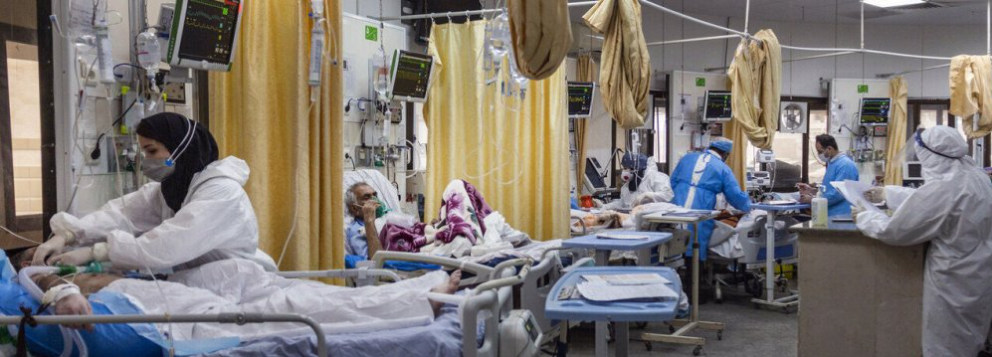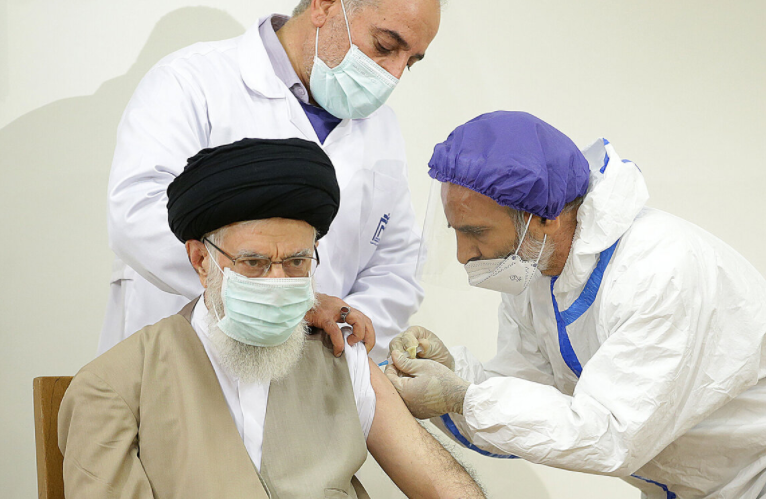August 06, 2021

The medical establishment in Iran fears the coronavirus epidemic is about to overwhelm the country as the volume of new cases hits a new peak and doctors and nurses are falling due to overwork.
In desperation, Health Minister Saeed Namaki wrote the Supreme Leader August 2 asking for a nationwide lockdown backed by the full force of the military.
The heads of 65 medical universities publicly warned that hospitals are being overwhelmed and health personnel are exhausted as the highly contagious delta variant of the coronavirus rapidly spreads across Iran.

A large influx of patients and supply shortages have pushed the physical and mental capacity of healthcare workers to the breaking point, a letter from the 65 published July 30 said.
“Negligence over health protocols and a lack of resolve to stop the disease … has caused feelings of isolation, hopelessness and fatigue among health personnel,” the letter said.
The government has launched periodic local lockdowns in the past. It announced a six-day lockdown for Tehran and Karaj during the religious holidays at the end of July. But news reports said the order was largely ignored by a public that has wearied of fighting the disease.
Namaki said the inaction means the disease is about to take over the country. He said the disease’s spread would not only be “catastrophic” but “irreversible” if the regime doesn’t take action swiftly.
He said even if the country does not run out of hospital beds, it will soon run out of health care staff. “Even though they are vaccinated, my co-workers are all becoming sick due to long bouts of sleeplessness and stress,” he said.
But Supreme Leader Ali Khamenehi largely brushed aside both letters. All he did was issue a statement telling the committee overseeing the coronavirus response to look into the issue and take actions it considered necessary.
The spokesman for the committee, Alireza Raisi, had already called for a nationwide lockdown himself. “Maybe we can deceive ourselves, but we cannot deceive the virus,” he said. “We need a strict nationwide shutdown. Anyone that violates it can be sure they have taken someone else’s life.”
He suggested a two-week lockdown with the military enforcing it.
The delta variant, first found in India, has spread to 29 of Iran’s 31 provinces and placed 285 cities on red alert.
According to a report released by the US Centers for Disease Control and Prevention, the delta variant is as infectious as chickenpox and even vaccinated people can easily transmit it.
The spokesman, Raisi, announced July 31 that hospitalizations were “rapidly rising,” with many hospitals having no room for new patients. He also said, “Adherence to health protocols has dropped to under 40 percent,” meaning most members of the public are no longer helping fight the disease.
So far, 10 million Iranians have received the first shot of a coronavirus vaccine and 2.7 million, or only 3 percent of the population, have been fully vaccinated.
At the end of July, Iran lowered the vaccine eligibility age to 55 and allowed five at-risk groups to begin getting the vaccine: public transport operators, prisoners, teachers, reporters and diabetics.
Nationally, the total number of cases passed 4 million or almost 5 percent of the population on August 4. The death toll passed 90,000 on July 29. The worst news is that the country is facing yet another spike; the daily total of new cases hit a record peak of 39,019 August 3. The daily death toll is just starting to rise, and remains far below its record of 582 on April 21. The highest recent daily figure was 411 on August 2. But on several recent days, Iran has reported more deaths than even the United States.
Although the regime constantly harps on Iranian-made vaccines, those vaccines have yet to emerge in large volume only 1.5 million at the start of August. Most of the doses available 12 million as of the start of August are foreign-made. Most of them are from China. Russia’s promises have been unfulfilled. The other major source of foreign vaccines is AstraZeneca, a British-developed shot. Although the Supreme Leader banned British and American vaccines as untrustworthy, Iran is buying a lot AstraZeneca shots, but describing them as Korean or something else depending on where the factory supplying them is located.
Khamenehi has blamed the slow response primarily on foreign producers failing to fulfill their promises to supply vaccine. He has not mentioned the failure of Iranian firms to produce anywhere near the volume promised.
Earlier in June, Maj. Gen. Hossain Salami, commander of the Pasdaran, unveiled plans to produce a huge volume of a vaccine the military is still working on and said Iran will save the poor people of the world. He also said it was time for Iran to make its vaccines available to the Americans, who, he said, cannot supply their own needs the way Iran could.
Meanwhile, IranWire reported that the one Iranian vaccine now being manufactured, Cov-Iran Barakat, costs three times as much as imported vaccines.


















